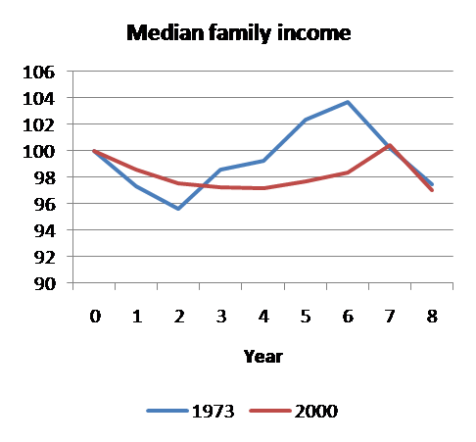Did The Postwar System Fail?
I’ve been posting about the contrast between the popular perception on the right that America had slow growth until Reagan came along, and the reality that we did fine pre-Reagan, in fact better; see here, here, and here. And what I’m getting as a common response — including from liberals — is something along the lines of, “That’s all very well, but by 1980 the postwar system was clearly failing, so what would you have done instead of Reaganomics?”
Which all goes to show just how thoroughly almost everyone has been indoctrinated by the current orthodoxy.
How do we know that the postwar system was failing? Yes, there were some bad years — largely due to oil shocks — and there was stagflation. But stagflation was not, as far as I know — and as far as standard textbook economics says — the result of high taxes and/or excessive regulation; it was a problem of monetary policy. It’s a testimony to the strength of supply-side propaganda that so many people think they know differently.
And how bad were those bad years, anyway? Well, let’s look at real median family income over two 8-year stretches, 1973 to 1981 and 2000 to 2008, in each case with income in the first year set to 100:
 Census
Census Funny, isn’t it? The Ford-Carter years look no worse — in fact, somewhat better — than the Bush years, especially if you look from business cycle peak to business cycle peak. And that was in the face of two very severe oil shocks. So a question for all the people who say that the economic troubles under Jimmy Carter discredited postwar economic policies: why don’t the troubles under Bush similarly discredit post-Reagan policies? Funny how that works.
Here’s what I think: inflation did have to be brought down — and Paul Volcker, not Reagan, did what was necessary. But the rest — slashing taxes on the rich, breaking the unions, letting inflation erode the minimum wage — wasn’t necessary at all. We could have gone on with a more progressive tax system, a stronger labor movement, and so on.
In the modern vision, the old US economy is seen as an absurd, unworkable thing. Where were the incentives to grow super-rich? How did you manage with all those well-paid, organized workers? But I’m old enough to remember that system, and it was no more unworkable than what we have now. Radical change happened because a powerful political movement wanted it, not out of economic necessity.